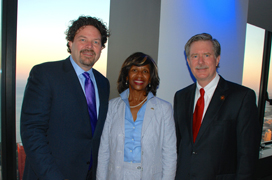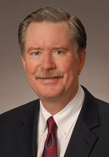© 2015 The Texas Lawbook.
By Brooks Igo
(Sept. 4) – Locke Lord is playing a leading role in shaping the legal profession locally, statewide and nationally.
In August, Paulette Brown, a labor and employment partner in the firm’s Morristown, NJ office, began her presidency of the American Bar Association. She is the first woman of color to hold the position in the ABA’s 136-year history.
Brown’s one-year term, which runs through the ABA Annual Meeting next August, overlaps with two Dallas Locke Lord partners’ bar association presidencies.
Brad Weber, co-leader of the firm’s antitrust practice, is the current president of the Dallas Bar Association for 2015. In June, corporate partner Frank Stevenson was sworn in as president-elect of the State Bar of Texas.
Stevenson, who will serve as president of the State Bar from June 2016 to June 2017, says the intersecting presidencies offer a unique opportunity “to share best practices regarding the critical issues facing the profession, including advancing diversity, adapting to new technology and ensuring access to justice for all citizens.”

One example of the Locke Lord leaders working together is the ABA’s upcoming National Celebration of Pro Bono from October 25-31. Brown, in an effort to increase outreach to economically disadvantaged people, is spearheading a new signature event on Oct. 30 called And Justice for All: An ABA Day of Service.
Weber says he let Brown know that the DBA will be an “active participant” in both Pro Bono Week and the ABA Day of Service.
Diversity is another point of emphasis for Brown, Stevenson and Weber.
Brown has created the Commission on Diversity and Inclusion 360 to review and analyze diversity and inclusion in the legal profession, the judicial system and the ABA with a goal of developing sustainable action plans.
“Working to eliminate bias and enhance diversity and inclusion is one of the four goals of the ABA and it is critically important that the ABA increase its efforts at this time in our nation’s history,” Brown said in a statement. “If we are true to our calling as lawyers, we must address this issue.”
In a Q&A with The Texas Lawbook, Stevenson and Weber identified specific goals for their respective bar associations and addressed their biggest challenges.
The Texas Lawbook: What do you hope to achieve as president of your bar association?
BW: When I started thinking about my “theme” as the 2015 President of the DBA, I kept coming back to the idea that we, as a bar association, really need to assist the “new generation” of law students and young lawyers who are entering into the legal market.

One of the ways the DBA is doing this is through the Transition to Law Practice Program. This program was the brainchild of Justice Doug Lang and then-DBA President Frank Stevenson back in 2008. The concept of the program is to match experienced lawyers with new attorneys at the beginning of their legal careers. Through a series of group presentations and one-on-one mentoring, the new lawyers are provided with the necessary essentials to start their careers on the proper path. This year the Transition to Law Practice Program includes a number new features, which I think has improved the program and made it more accessible to our younger lawyers.
The DBA also is working with a number of local and regional law schools in North Texas to sponsor a debt counseling conference, which will focus on options for law students and young lawyers to better manage their student loan debts and understand law firm financial issues. This conference will take place in October and we are anticipating that over a hundred law students will attend.
In addition, for 2015 I am focusing on another segment of our community with the creation of a new DBA Section. It was brought to my attention last year that the DBA does not have an Immigration Law section, despite the fact that Dallas is now the home for over 350,000 foreign-born residents, and immigration law reform is one of the high-profile legal issues in our country today.
FS: I plan to focus on furthering our profession’s core imperatives: pro bono, diversity and professionalism. That includes instilling these values in the young lawyers who will inherit our profession and ensuring we are engaging all our members, listening to their needs, responding with practical assistance and delivering palpable benefits.
TLB: What are the biggest challenges unique to your bar association?
BW: As a volunteer bar association, the DBA faces two significant challenges this year and on into the future: (1) continuing to provide valuable and compelling benefits and services to our members, especially in the face of growing competition from other CLE providers and information sources; and (2) attracting the active and sustained participation of expanded segments of the lawyer population in Dallas, including young and newly-licensed lawyers, minority lawyers and specialized groups such as the criminal bar, government lawyers and in-house counsel. Most of my efforts this year as DBA President have been focused on these two challenges.

FS: The State Bar of Texas must continue working to protect the public and its lawyers against the unauthorized practice of law. I believe the bar must expand its career counseling and job placement services to support our members. We must also continue to protect our ability to self-regulate, and to educate the public about the unique role that lawyers play in providing legal aid, serving their communities and promoting justice.
Finally, I want to continue my predecessors’ efforts in further knitting together the Texas bar.
Campaigning last March, I crisscrossed this state, meeting Texas lawyers: The 96-year-old in Amarillo who flew to danger from the deck of World War II carriers; the legal services lawyer in Edinburg, fresh from law school and luminous with the prospect of serving the least, the lost and the last; the two guys in blue jeans, excitedly setting up their new law firm in Longview; the assistant county attorney in El Paso, quietly capping his career of celebrated service to the people of this state.
On the surface, all so different, but at their core, so irreducibly the same. We must not be so credulous as to allow what merely differentiates us to ultimately divide us. Wherever you go and whomever you ask, all Texas lawyers – and I suspect all American lawyers – seek precisely the same things: Justice for the people, honor for the profession and opportunity for themselves.
© 2014 The Texas Lawbook. Content of The Texas Lawbook is controlled and protected by specific licensing agreements with our subscribers and under federal copyright laws. Any distribution of this content without the consent of The Texas Lawbook is prohibited.
If you see any inaccuracy in any article in The Texas Lawbook, please contact us. Our goal is content that is 100% true and accurate. Thank you.
